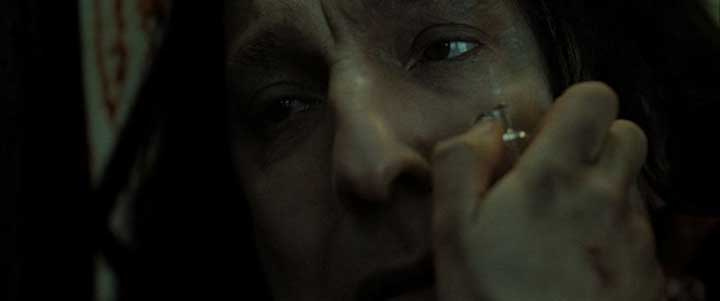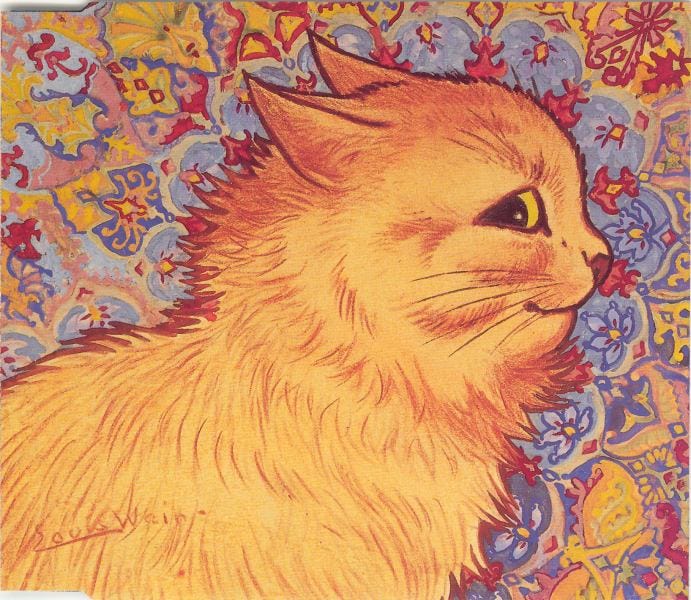It’s so nice to have a long weekend off. Yesterday I curled up in cat slippers, snuggled with actual cats, and sniffled through parts 1 and 2 of Harry Potter and the Deathly Hallows. I love the Harry Potter books and movies as much for the inner struggles and hidden depths of the characters as for the adventure and wizardry. Harry is a hero Joseph Campbell would have beamed at, but in the end, the story has several heroes. The most compelling is Snape, played by the incomparable Alan Rickman, rest his soul. Spoiler alert for anyone on earth who doesn’t yet know the ending.
Snape’s lifelong heroic struggle isn’t revealed until he is dying. As tears fall from his eyes, Snape tells Harry to catch them and bring them to the pensieve, a magical scrying bowl that plays memories. He also tells Harry, “You have your mother’s eyes.” Snape’s memories reveal the significance of that recognition: Harry is not, after all, like his arrogant father who had stolen Snape’s beloved Lily and then bullied Snape in school. As an adult, Snape still seethed over James’ cruelty—and Harry was the spitting image of his dad. Snape’s bitterness made him the villain-like foil to Harry all through the series, even while—we learn from memories stored in tears—Snape repeatedly, secretly saved Harry’s life. In reality, Snape always did the right thing, the hard thing, and bore his suffering alone. I thank J.K. Rowling for writing the perfect role for Rickman to play toward the end of his life.
Then Rowling had to go and ruin it all by tweeting hatefulness toward trans people. Wait, what? No, she didn’t really. It’s complicated. I found a fair-minded account here (I love that Glamour and Teen Vogue now have serious journalism) with a link to Rowling’s own explanation. Basically, Rowling expressed a strong opinion about the concept and language of biological sex that some people took as a cruel attack. She unfortunately started with some snark, and Twitter exploded.

We’re all made of words these days in our social media trenches with armed drones flying overhead. Probably Rowling should have known better than to be sarcastic about such a sensitive issue. That tweet primed the pump of overreaction. But—death threats and Harry Potter book burnings? I’m worried that we don’t see each other as real, complex people anymore—that these disembodied snippets are turning us all into cardboard cutouts for target practice. It’s not our sex, biological or self-defined, that’s being erased; it’s our humanness.
Back when I was on Facebook, I tried to bridge a few crocodile-filled moats of human difference. I’m deeply grateful for the times it went well: I now have some dear friends in Gaza and Libya, two of the most anti-Semitic places on earth. (We send each other cat pics.) But sometimes, my efforts went so spectacularly badly that I’d spend a week worrying I hadn’t hit the “block” button fast enough.
I tried to reason once with a young neo-Nazi. He was bright and articulate, so I figured it was worth a try. He strung me along a bit and then posted a YouTube video of himself reading my comments aloud in a prissy, high-pitched English schoolmarm voice. For a minute there, I got to be Maggie Smith as McGonagall.
That would’ve been just funny if the pale young man in his stark room had ever changed his expression or blinked his icy blue eyes, and if he hadn’t added that I was excrement on the bottom of his shoe.1 I can still see that dissociated, pinpoint-pupil stare. As Dumbledore said to Harry about the curled-up, flayed homunculus of Voldemort’s soul, some things are beyond our help.
The men who really believe in themselves are all in lunatic asylums.
—G.K. Chesterton
In a group called “Civil Discourse,” a young progressive professor shared this lovely video, “The Danger of a Single Story.” It’s really worth watching. Ironically, though, she shared it to explain why she wasn’t interested in my quote from G.K. Chesterton or anything else a white Englishman might have said because “they” represented everything she was fighting against.
That’s the thing when people think they’re at war: only their side gets to have more than one story—to be human. Everyone on the other side is a presumed Death Eater. I didn’t last long in Civil Discourse, and I uncivilly stuck out my tongue on the way out.
And that’s the thing when we feel maligned or, in tweet-speak, “othered”: we tend to dig in deeper and shoot blindly from our trenches. The alternative, maybe, is to recognize and invite the best intentions in the “other.” It doesn’t always work, but it beats trench warfare.
“If we treat people as if they were what they ought to be, we help them become what they are capable of becoming.” —Goethe (abbreviated version)
So here I am on Thanksgiving weekend, feeling thankful for the best of J.K., G.K., and the other complicated humans whose words are part of me. I wish we could all give each other the benefit of the doubt that our tears would reveal a heroic struggle. Maybe that effort is the biggest—and riskiest—struggle of all.
p.s. Here’s some art from wonderful, tragic Louis Wain, the Englishman who invented cat pics and ended his days in a mental institution. I highly recommend the movie about his life.
I realllly wish I hadn’t just searched “How many Nazis does it take to change a light bulb?”




